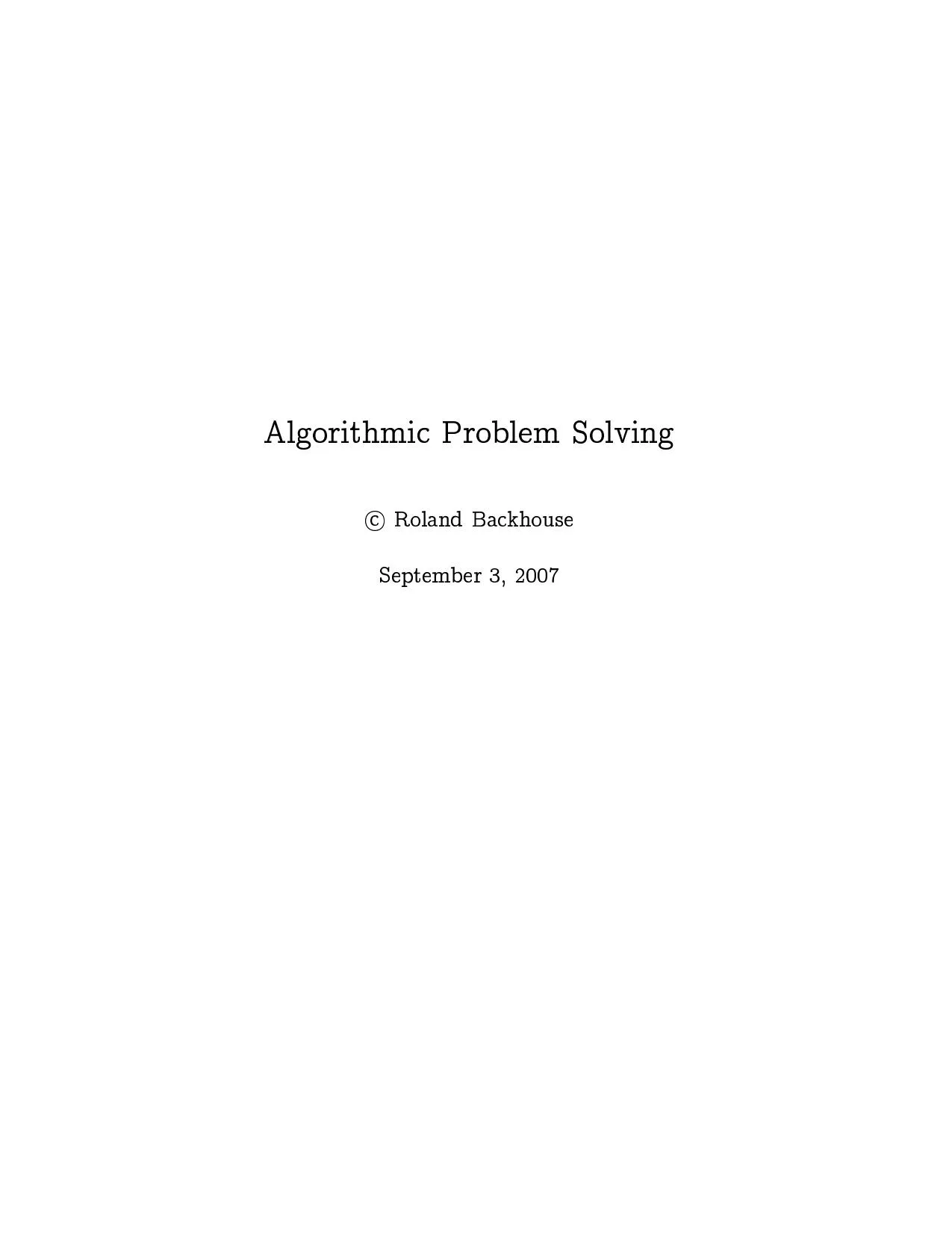Algorithmic Problem Solving (2007)
4.6
بر اساس نظر کاربران

شما میتونید سوالاتتون در باره کتاب رو از هوش مصنوعیش بعد از ورود بپرسید
هر دانلود یا پرسش از هوش مصنوعی 2 امتیاز لازم دارد، برای بدست آوردن امتیاز رایگان، به صفحه ی راهنمای امتیازات سر بزنید و یک سری کار ارزشمند انجام بدینمقدمه
کتاب Algorithmic Problem Solving نوشته رولاند باکهاوس در سال ۲۰۰۷، یکی از مهمترین منابع برای توسعهدهندگان کامپیوتر، دانشجویان علوم کامپیوتر، و علاقهمندان به حل مسئله الگوریتمی است. این کتاب به طور جامع و سیستماتیک به اصول پایهای طراحی الگوریتمها و تکنیکهای حل مسئله میپردازد. با سبکی پرمحتوا و آموزشی، این اثر به خوانندگان کمک میکند توانایی تحلیل مسائل پیچیده، یافتن راهحلهای بهینه و درک عمیقتر مفاهیم الگوریتمی را بدست آورند.
خلاصه دقیق از محتوای کتاب
کتاب Algorithmic Problem Solving شامل طیف وسیعی از موضوعات در حوزه الگوریتمها است. این کتاب از مفاهیم پایه شروع کرده و به تدریج با معرفی روشهای پیچیدهتر ساختار حل مسئله را بهبود میبخشد. نویسنده تأکید ویژهای بر تکنیکهای طراحی الگوریتم همچون Divide and Conquer، Greedy Algorithms، Dynamic Programming و سایر روشهای اساسی دارد. علاوه بر این، موضوعاتی همچون پیچیدگی زمانی و فضایی الحل مسائل نیز به صورت تحلیلی پوشش داده میشود.
کتاب با هدف پرورش مهارتهای خلاقانه برای توسعه راهحلهای الگوریتمی نگارش شده است. نویسنده از مثالها و تمرینات متعددی بهره برده تا به خوانندگان در تسلط بر مفاهیم یاری کند. هر فصل به دنبال ارائه تکنیکهای عملی برای حل مشکلات واقعی در حوزه محاسبات و ریاضیات است. همچنین مطالب نظری و اثباتها به خوبی با نکات کاربردی ترکیب شده تا خواننده بتواند نه تنها درک عمیقی از مبانی داشته باشد، بلکه الگوریتمها را در عمل نیز پیادهسازی کند.
نکات کلیدی و آموختههای اصلی
- یادگیری سیستماتیک فرایند حل مسئله با الگوریتمها.
- درک انواع الگوریتمها همچون Greedy، Dynamic Programming و Backtracking.
- تحلیل پیچیدگی زمانی و فضایی راهحلها.
- چگونگی مدلسازی مسائل واقعی به زبان الگوریتمیک.
- اهمیت تفکر منطقی و خلاقانه در حل مسائل پیچیده.
جملات معروف از کتاب
“Problem solving is the art of transforming a problem into an algorithm.”
“The key to success in algorithmic problem solving is iteration and continual improvement.”
“Algorithms are more than mere recipes; they are solutions to problems structured to be both efficient and elegant.”
اهمیت این کتاب
کتاب Algorithmic Problem Solving نه تنها یک منبع آموزشی برای دانشجویان و متخصصان است، بلکه برای هر کسی که به بهبود تواناییهای حل مسئله الگوریتمیک علاقه دارد، یک سرمایهگذاری ارزشمند است. در دنیای امروز، که وابستگی به تکنولوژی و الگوریتمها بیشتر از همیشه شده، این کتاب به عنوان سکوی پرش برای یادگیری اصولی و عملی در نظر گرفته میشود. از فهم اصول پایه تا تکنیکهای پیشرفته، این کتاب ابزارهایی را در اختیار شما میگذارد که برای پیشرفت در هر زمینهای از علم کامپیوتر حیاتی است.
Introduction to "Algorithmic Problem Solving (2007)"
Written by Roland Backhouse, "Algorithmic Problem Solving (2007)" is a cornerstone text in the field of computer science and mathematics. This book takes readers on a journey into the art and science of problem-solving using algorithms, presenting it in a systematic and rigorous way. Combining deep theoretical insights with practical methodologies, the book serves as an essential guide for both students and professionals who wish to enhance their reasoning and problem-solving skills.
Unlike many technical books, "Algorithmic Problem Solving" doesn’t merely focus on coding or programming languages. Instead, it emphasizes the principles and techniques underpinning systematic algorithm design. The goal is to foster a mindset that allows readers to tackle complex problems by breaking them down into manageable, solvable components. This work provides readers with the tools to think algorithmically, an indispensable skill for solving challenges in computer science, data science, operations research, and beyond.
A Detailed Summary of the Book
"Algorithmic Problem Solving (2007)" explores the foundations of algorithms, emphasizing structured thinking and mathematical reasoning as critical components of problem-solving. The book divides its content into methodologically sound chapters, starting with basic principles such as fundamental logic, iterations, and recursion, and eventually delving into more advanced topics such as optimization, combinatorics, and formal correctness proofs.
Roland Backhouse frames the art of problem-solving as a step-by-step process of refinement. The book extensively covers inductive reasoning, recursive thinking, and abstraction, ensuring that readers learn how to generalize specific solutions into reusable frameworks. Backhouse also introduces various formal techniques, such as invariants and problem specifications, which help in reasoning about solutions systematically.
One distinguishing feature of the book is its integration of theoretical concepts with practical examples. Each chapter includes problems of increasing complexity, encouraging readers to apply newly learned concepts to concrete scenarios. In addition to technical exercises, the book also poses open-ended questions aimed at sharpening one’s analytical intuition. These carefully designed problems ensure that readers not only memorize techniques but integrate them into their professional thinking.
Key Takeaways
- Understanding the importance of algorithm design as a problem-solving methodology.
- Developing the skills to analyze problems and deduce efficient solutions systematically.
- Learning how to create and reason about program correctness using formal methods.
- Gaining deeper knowledge of topics such as recursion, inductive proofs, and combinatorics.
- Appreciating the importance of abstraction and modularity in algorithmic thinking.
Backhouse ensures that each takeaway is reinforced through real-world applications, exercises, and examples, making the material practical and accessible.
Famous Quotes from the Book
"An algorithm is never just an answer to a problem; it is a structured approach to understanding the problem itself."
"To solve a problem algorithmically is to engage in the act of systematic reasoning, predicated on logic and clarity."
"Efficiency in computation is not just a technical goal—it’s often the difference between success and failure in real-world applications."
Why This Book Matters
In a world increasingly driven by technology, the ability to think algorithmically is more critical than ever. "Algorithmic Problem Solving" addresses this need by teaching readers how to approach challenges in a logical and structured manner. Whether you are a programmer who designs software, a data analyst solving optimization problems, or a researcher exploring mathematical models, the insights in this book are indispensable.
Roland Backhouse doesn’t just teach algorithmic techniques—he imparts a mindset. By focusing on concepts such as abstraction, decomposition, and iteration, the book nurtures a fundamentally different way of thinking: one that is applicable across disciplines and industries. This universal applicability makes the book essential not only for computer scientists but also for anyone seeking to improve their problem-solving skills.
Another reason this book matters is its emphasis on rigor and correctness. In an era where software bugs can have catastrophic consequences, the ability to formally verify solutions is invaluable. By teaching readers the principles behind proving algorithmic correctness, Backhouse equips them to build systems that are not only functional but trustworthy and reliable.
Ultimately, "Algorithmic Problem Solving (2007)" is about more than algorithms—it’s a guide to thinking systematically, solving problems efficiently, and applying this knowledge to make a meaningful impact in the world.
دانلود رایگان مستقیم
برای دانلود رایگان این کتاب و هزاران کتاب دیگه همین حالا عضو بشین
برای خواندن این کتاب باید نرم افزار PDF Reader را دانلود کنید Foxit Reader


